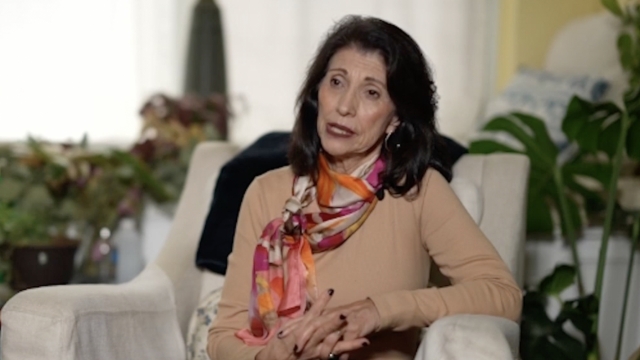(Scripps News) — Within the pages of "American Mother," it's one mother — Diane Foley — whose voice bursts from the page.
"I really wanted to do a book so that people might understand what we went through and the challenge our country faces," she said.
The story begins in 2012. Foley's oldest son, James — nicknamed Jim — headed off to Syria as a freelance journalist to cover the ongoing civil war there. He was kidnapped, held and tortured for two years by several British members of ISIS, who later beheaded Jim on camera.
This is how Diane Foley found out what happened to him.
"I looked at Twitter and there was the horrific image of Jim's head on his back," she said. "I mean, it was just shocking."
The shock of the cruelty spread across the nation and world.
Diane Foley turned her devastating loss into action, creating the James W. Foley Legacy Foundation and becoming a champion for Americans held hostage overseas and for emerging journalists looking to cover news overseas, much like Jim did. It's one part of her son's legacy.
Eventually, Jim's killers were tracked down: One was killed by a U.S. drone strike; the other two captured by Kurdish militia forces in northern Syria. They were taken into custody and extradited to the U.S. for trial. One of them was Alexande Kotey.
"Alexanda chose to plead guilty to all eight counts, pleaded guilty to everything, and he offered to meet with victims," Foley said. "And I knew Jim would have met him and wanted to hear his side of the story."
Over the course of three meetings, Foley met with her son's killer inside a windowless room in a Virginia courtroom, with lawyers from the defense and prosecution nearby.
"It was awkward. It was awkward for him and for me. But in time, it was kind of odd — the rest of the people kind of melted away," Foley said. "And, then, we were able to hear each other. So, the best day really was the second day. I think we are both more relaxed and since I have a son his age, it wasn't that hard to see him as a person who'd made a horrific mistake that'll change his life, for the rest of his life. So, all in all, it was quite a sad encounter."
However, he did not directly apologize for his crime.
SEE MORE: Families of Americans detained overseas plead for White House help
"Well, he expressed remorse. He apologized for the suffering I had undergone and our family. He really didn't apologize for what he did to Jim. He saw that as separate and kind of part of their war and the vendetta against the West," Foley said. "But, he wrote me several letters after that, and they all were filled with similar remorse. So, there was a part of it that was, I think, healing on both sides. We were able to hear each other. That felt good."
One of those letters he wrote to Foley is reproduced in the book — the careful, looping cursive from the person who took so much from her. Foley said confronting him was difficult.
"It wasn't easy at all, but I just knew Jim would have done the same thing. And so, Jim, right along since he was killed, has challenged me to try to be a better person, a bigger person," Foley said. "So, that challenged me to try to do the same. So, with God's help and Colum's generous offer to accompany me, I was able to go, so I'm grateful."
Colum is the book's co-author, Colum McCann.
"It was one of the most extraordinary moments of my life," he said.
McCann accompanied Foley during the courthouse conversations with Kotey, when Foley's own family decided not to, and said he witnessed her strength during that time.
"She's extraordinary, but she's also ordinary. Diane is a nurse practitioner. She lived in a suburban house in New Hampshire. Her son went away and her son didn't come back, but she decided that, out of all of that, she would change the way that other sons and daughters would come back," McCann said. "That, to me, is a powerful, powerful story. So, it's about redemption. It's about courage, and it's about recognizing each other, even across the divides."
It's those divides that Foley said she wants to bridge and it's one of the reasons she's telling her story — Jim's story — in full now.
"I hope we inspire people. These are kind of dark times, in some ways, and I think Jim's horrific murder was kind of just a symbol of that looming hatred," Foley said. "We really need to work on deterrence. How do we prevent the targeting of innocent people and making them political pawns in terms of war? So, we really need to start building those bridges again before it's too late."
It is something that Foley herself is trying to do, by turning one page at a time.
Jim Foley's death and that of several other American hostages shortly after spurred the federal government to create a new position — a special presidential envoy who would handle cases of Americans held hostage overseas. That point person didn't exist when Jim was kidnapped, but now it does — and it is something that Diane Foley also sees as part of her son's legacy.
Trending stories at Scrippsnews.com





